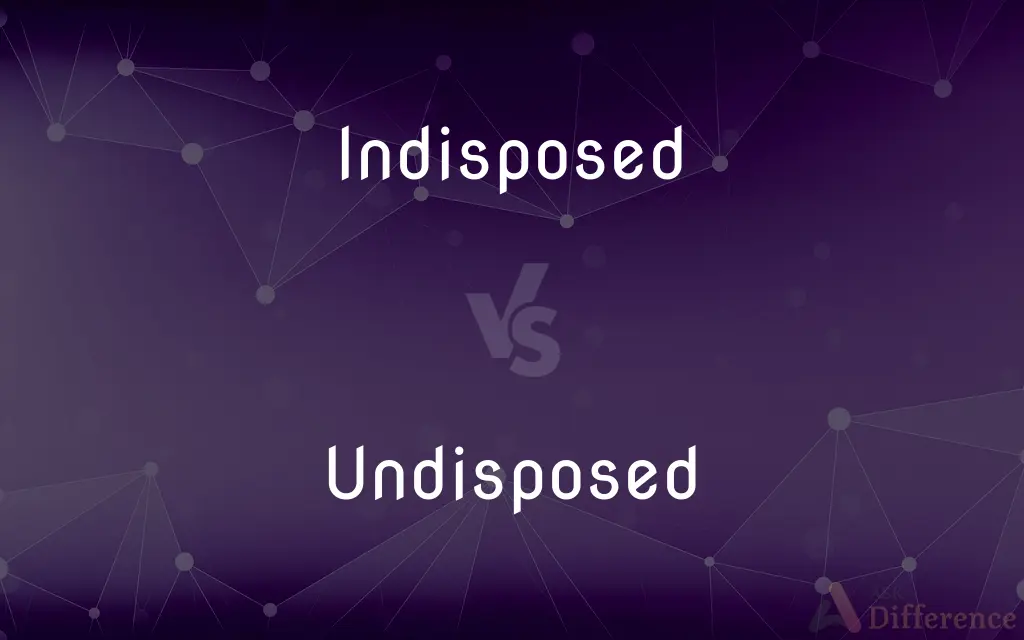Indisposed vs. Undisposed — What's the Difference?
By Tayyaba Rehman & Maham Liaqat — Updated on March 26, 2024
Indisposed suggests being slightly unwell or unwilling, whereas undisposed implies a lack of inclination or readiness.

Difference Between Indisposed and Undisposed
Table of Contents
ADVERTISEMENT
Key Differences
Indisposed primarily refers to someone who is slightly ill or not feeling well enough to participate in usual activities or obligations. It can also imply a mild reluctance or unwillingness to do something, often because of the minor illness or discomfort. Undisposed, on the other hand, lacks the implication of illness and focuses more on a person's lack of inclination or readiness towards something. It might indicate a general reluctance or unpreparedness without any physical ailment as a cause.
While both terms can signify an unwillingness, indisposed often has a connotation of a temporary state, usually health-related, affecting one’s ability to engage in activities. It's as if the person would otherwise be willing if not for the illness or discomfort. Undisposed suggests a more deliberate stance or decision not to be inclined or ready to do something, not necessarily linked to a temporary state or condition. It reflects more of a choice or a state of mind than an imposed condition like illness.
In everyday usage, indisposed is commonly understood and accepted as a polite way to excuse oneself from obligations due to minor health issues or slight discomfort, without needing to delve into specifics. Conversely, undisposed can be used in a broader range of contexts, not limited to personal health or capability. It can reflect attitudes, preferences, or decisions regarding actions, investments, agreements, and more, highlighting a more conscious decision-making process.
Comparison Chart
Definition
Slightly unwell or unwilling
Lacking inclination or readiness
Connotation
Temporary health issue or mild reluctance
Deliberate reluctance or unpreparedness
ADVERTISEMENT
Common Usage
Excusing absence due to minor illness
Expressing lack of readiness or inclination
Focus
Temporary personal condition
State of mind or decision-making process
Example Scenario
Missing a meeting due to a headache
Hesitating to invest in a new project
Compare with Definitions
Indisposed
Reluctant or unwilling due to minor health issues.
He was indisposed to going out because of his cold.
Undisposed
Not inclined or disinclined towards something.
They were undisposed to make any changes to the plan.
Indisposed
Temporarily unable to engage in certain duties.
The professor was indisposed, so the lecture was postponed.
Undisposed
Not favorable or disposed to a suggestion.
The committee was undisposed to accepting the proposal without revisions.
Indisposed
Politely declining an invitation or obligation due to health.
I must regretfully decline your invitation as I am indisposed.
Undisposed
Lacking readiness or preparation.
The team was undisposed for the sudden inspection.
Indisposed
Slightly unwell or not in a state to perform usual activities.
She was indisposed and couldn't attend the dinner party.
Undisposed
Showing no interest or enthusiasm.
He seemed undisposed towards the project idea.
Indisposed
Feeling a mild discomfort or ailment.
Feeling indisposed, she decided to rest at home.
Undisposed
Reflecting a deliberate choice not to engage.
Despite the opportunity, she was undisposed to relocate for the job.
Indisposed
Mildly ill.
Undisposed
Not settled, removed, or resolved
Undisposed assets.
Indisposed
Averse; disinclined
Was clearly indisposed to grant their request.
Undisposed
Disinclined; unwilling
Undisposed to help us.
Indisposed
Mildly ill.
He was indisposed with a cold.
Undisposed
Not disposed; uninclined.
Indisposed
Not disposed, predisposed, or inclined; unwilling.
I stayed indoors all day, feeling indisposed to finish mowing the lawn.
Undisposed
Not sold, allocated, or otherwise arranged.
Indisposed
Not yet ready (especially with regard to receiving a visitor) because not yet arranged into a state of readiness (i.e., not disposed); (especially, more specifically):
Indisposed
(euphemistic) In the lavatory/WC.
Indisposed
(euphemistic) Undressed; not yet dressed enough to be seen by visitors.
Indisposed
Somewhat ill or prone to illness;
My poor ailing grandmother
Feeling a bit indisposed today
You look a little peaked
Feeling poorly
A sickly child
Is unwell and can't come to work
Indisposed
(usually followed by `to') strongly opposed;
Antipathetic to new ideas
Averse to taking risks
Loath to go on such short notice
Clearly indisposed to grant their request
Common Curiosities
Can someone be indisposed for reasons other than illness?
Yes, while often related to health, being indisposed can also imply a mild reluctance or unwillingness not strictly tied to illness.
What does it mean to be indisposed?
Being indisposed means being slightly unwell or mildly unwilling to do something, often due to minor health issues.
Is being undisposed always a negative stance?
Not necessarily; being undisposed can simply indicate a neutral lack of inclination or readiness, not always a negative or opposing stance.
How can I use indisposed in a sentence politely?
“I must apologize for being unable to attend; I find myself somewhat indisposed today.”
How does one convey being undisposed without sounding negative?
Phrasing like “I’m currently exploring all options and am thus undisposed to commit to any single course of action” can convey openness rather than negativity.
What does undisposed mean in a legal context?
In legal terms, undisposed might refer to a case or matter that hasn’t been decided, resolved, or inclined towards a particular outcome.
Is it common to use undisposed in everyday conversation?
It’s less common in casual speech, more often found in formal or written contexts.
Can organizations be described as indisposed or undisposed?
Yes, organizations can be described as either, depending on context—indisposed due to operational disruptions, or undisposed towards certain strategies or proposals.
How can being undisposed affect decision-making?
Being undisposed might slow down or complicate decision-making processes due to a lack of readiness or inclination.
Can environmental factors make someone indisposed?
Yes, factors like extreme weather or pollution can render someone indisposed.
What’s the difference in implication between indisposed and sick?
Indisposed suggests a milder condition than being sick, often used to avoid specifying the nature of the ailment or to sound more polite.
Can someone be undisposed towards positive changes?
Yes, one can be undisposed towards something positive if they’re not ready, inclined, or see it as positive.
Is being indisposed a permanent state?
No, being indisposed is typically a temporary condition.
In what situations is being undisposed beneficial?
Being undisposed can be beneficial when it allows for further consideration, preventing premature decisions.
Can the term indisposed be used humorously?
Yes, it can be used lightly or humorously to excuse oneself from minor obligations.
Share Your Discovery

Previous Comparison
Glass vs. Fibreglass
Next Comparison
Quiche vs. SouffleAuthor Spotlight
Written by
Tayyaba RehmanTayyaba Rehman is a distinguished writer, currently serving as a primary contributor to askdifference.com. As a researcher in semantics and etymology, Tayyaba's passion for the complexity of languages and their distinctions has found a perfect home on the platform. Tayyaba delves into the intricacies of language, distinguishing between commonly confused words and phrases, thereby providing clarity for readers worldwide.
Co-written by
Maham Liaqat













































